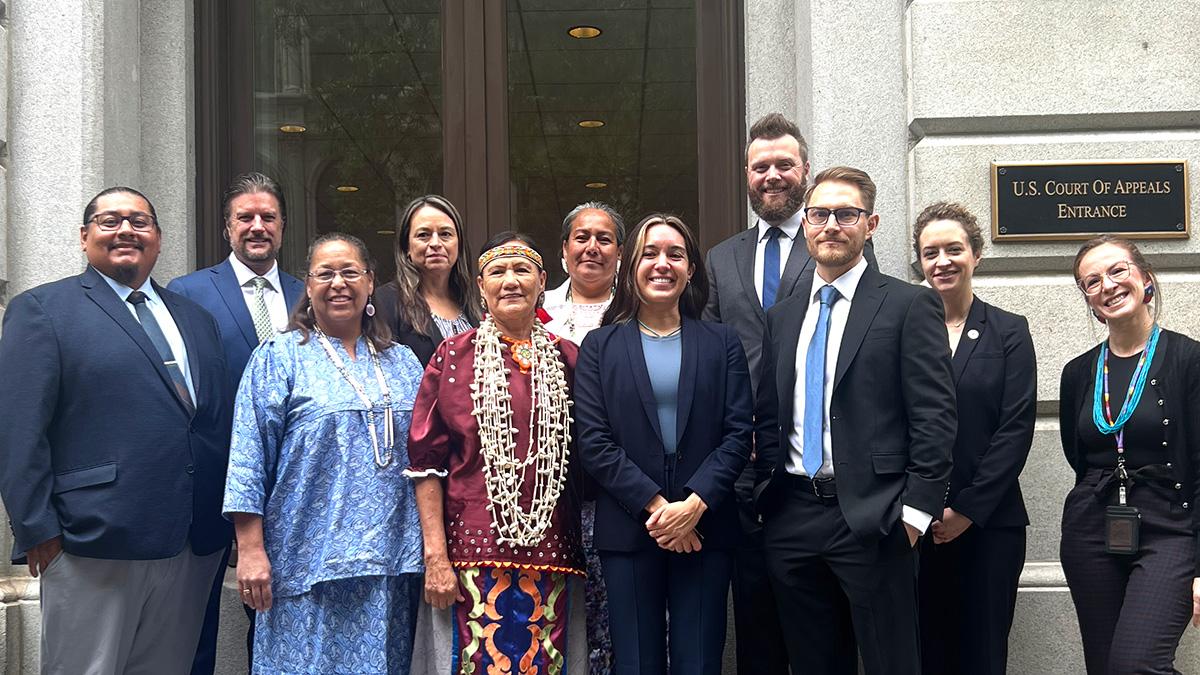
- Details
- By Native News Online Staff
On September 10, 2025, the Winnebago Tribe of Nebraska presented oral argument before the United States Court of Appeals for the Fourth Circuit in Winnebago Tribe of Nebraska v. United States Department of the Army. The hearing marked the Tribe’s appeal of the U.S. District Court for the Eastern District of Virginia’s August 2024 dismissal of its lawsuit under the Native American Graves Protection and Repatriation Act (NAGPRA). The case seeks to secure the return of the remains of two Winnebago children, Samuel Gilbert and Edward Hensley, who are buried at the Carlisle Barracks Post Cemetery.
The District Court had ruled that NAGPRA did not apply to the remains of children who died at Carlisle and were interred there. In its appeal, the Winnebago Tribe argued that both the purpose and plain language of NAGPRA require the repatriation of Samuel and Edward to their Tribal homeland.
NARF Staff Attorney Beth Margaret Wright urged the appellate court to reverse the lower court’s decision, stating:
“The District Court should be reversed. NAGPRA’s purpose is to provide Indian Tribes with a statutory right to bring home the remains of their own citizens from places they do not belong. NAGPRA provides Indian Tribes additional rights to ensure repatriation is tailored to the unique needs of Indian Tribes.”
During oral argument, Winnebago’s counsel described the historical mistreatment of the children’s remains. After Samuel and Edward died at Carlisle, the U.S. government buried them without notice to—or consent from—their families or the Tribe. In 1927, the Army relocated the children's remains from their original burial site to the current location at Carlisle Cemetery. That process involved excavating the remains, placing them haphazardly into boxes, and reinterring them—again without notice or consent.
Wright explained that NAGPRA not only mandates the return of Native American human remains to Tribal communities, but also acknowledges the long history of disrespect and improper control by federal agencies and institutions. These actions, she emphasized, denied Tribes the dignity of burying their relatives in accordance with their cultural and spiritual traditions.
The Winnebago Tribe now seeks to bring Samuel and Edward home—more than 125 years after their deaths—to provide them with the proper burials they were unjustly denied.
More Stories Like This
50 Years of Self-Determination: How a Landmark Act Empowered Tribal Sovereignty and Transformed Federal-Tribal RelationsNavajo Nation President Nygren Files in Court to Halt Removal Legislation
Alcatraz Sunrise Gathering Marks 50 Years of Indigenous Activism
Navajo Nation Vice President Distances Herself From President After Removal Resolution
Navajo Council Speaker Introduces Legislation to Remove Navajo Nation President, Vice President Amid Ethics Complaint
Help us tell the stories that could save Native languages and food traditions
At a critical moment for Indian Country, Native News Online is embarking on our most ambitious reporting project yet: "Cultivating Culture," a three-year investigation into two forces shaping Native community survival—food sovereignty and language revitalization.
The devastating impact of COVID-19 accelerated the loss of Native elders and with them, irreplaceable cultural knowledge. Yet across tribal communities, innovative leaders are fighting back, reclaiming traditional food systems and breathing new life into Native languages. These aren't just cultural preservation efforts—they're powerful pathways to community health, healing, and resilience.
Our dedicated reporting team will spend three years documenting these stories through on-the-ground reporting in 18 tribal communities, producing over 200 in-depth stories, 18 podcast episodes, and multimedia content that amplifies Indigenous voices. We'll show policymakers, funders, and allies how cultural restoration directly impacts physical and mental wellness while celebrating successful models of sovereignty and self-determination.
This isn't corporate media parachuting into Indian Country for a quick story. This is sustained, relationship-based journalism by Native reporters who understand these communities. It's "Warrior Journalism"—fearless reporting that serves the 5.5 million readers who depend on us for news that mainstream media often ignores.
We need your help right now. While we've secured partial funding, we're still $450,000 short of our three-year budget. Our immediate goal is $25,000 this month to keep this critical work moving forward—funding reporter salaries, travel to remote communities, photography, and the deep reporting these stories deserve.
Every dollar directly supports Indigenous journalists telling Indigenous stories. Whether it's $5 or $50, your contribution ensures these vital narratives of resilience, innovation, and hope don't disappear into silence.
 The stakes couldn't be higher. Native languages are being lost at an alarming rate. Food insecurity plagues many tribal communities. But solutions are emerging, and these stories need to be told.
The stakes couldn't be higher. Native languages are being lost at an alarming rate. Food insecurity plagues many tribal communities. But solutions are emerging, and these stories need to be told.
Support independent Native journalism. Fund the stories that matter.
Levi Rickert (Potawatomi), Editor & Publisher

